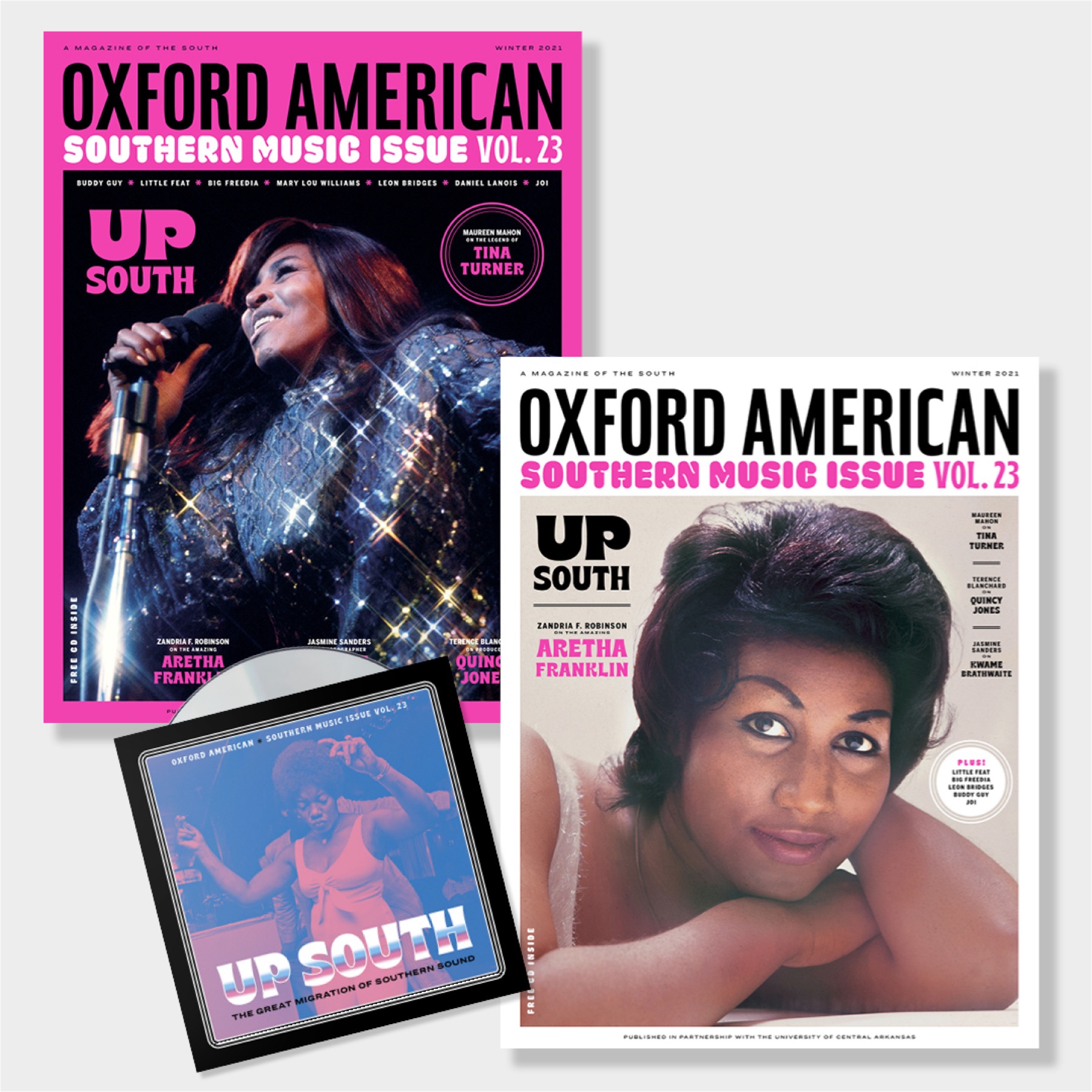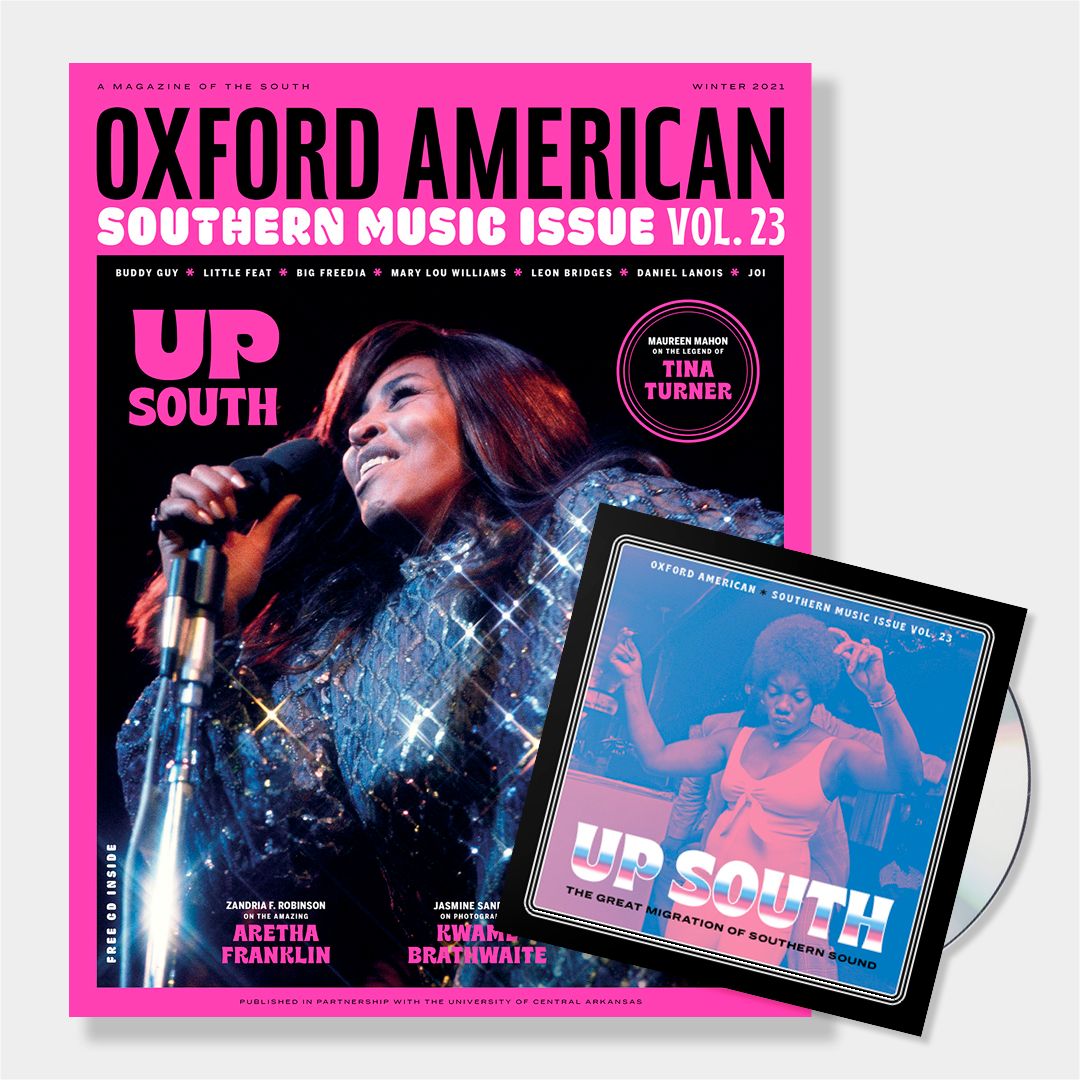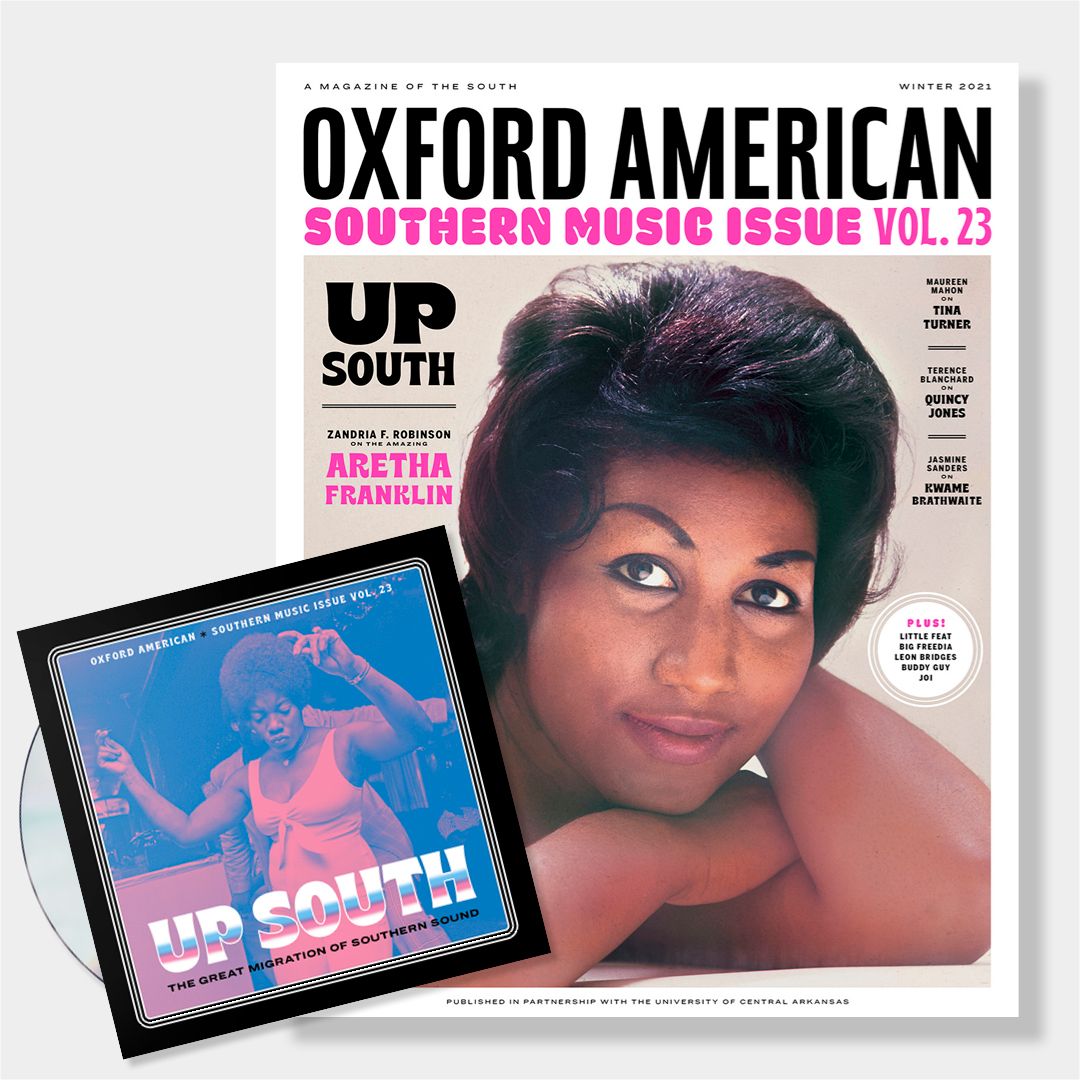Introducing the Up South Music Issue
Tina Turner and Aretha Franklin cover the Up South Music Issue
By Oxford American

The Oxford American’s 23rd annual Southern Music Issue celebrates the musical legacy of the Great Migration, tracing the movement of Southern sound to every corner of our nation and beyond. For the first time since our famed Visions of the Blues series from five years ago, we are thrilled to feature multiple iconic cover stars who represent the varied streams of music that have emanated from our region. An electric image of twice-inducted Rock & Roll Hall of Famer Tina Turner at Madison Square Garden in 1969 appears on the first cover. Born Anna Mae Bullock in Brownsville, Tennessee and now widely heralded as the Queen of Rock & Roll, Turner honed her musicianship in the migrant city of East St. Louis, Illinois. The second cover features an intimate portrait of the Queen of Soul, a rare outtake from a 1967 album shoot. Memphis-born, Detroit-raised Aretha Louise Franklin was the first woman performer inducted into the Rock & Roll Hall of Fame.


“This rural-to-urban, South-to-elsewhere movement of African American musicians shaped the sound and feel of genres such as gospel, jazz, blues, r&b, and rock & roll,” writes Maureen Mahon, author of Black Diamond Queens: African American Women and Rock and Roll, in her featured story on Turner. Throughout the issue, our writers map lineages, uncover histories, and highlight the South as the birthplace of many artists, techniques, and chart-toppers we now characterize as American music. OA contributing editor and Memphis native Zandria F. Robinson, author of This Ain’t Chicago: Race, Class, and Regional Identity in the Post-Soul South, tells the story of Franklin’s Amazing Grace. Recorded across two nights at New Temple Missionary Baptist Church in Los Angeles, Amazing Grace became the best-selling live gospel album of all time. Elsewhere in the issue, Tarisai Ngangura meditates on the tender, virtuosic songs Carolyn Franklin wrote for her older sister, such as “Ain’t No Way,” “Baby, Baby, Baby,” and “Angel.”
Our impressive lineup of contributors includes composer Terence Blanchard, who traces the Southern roots of Chicago-born Quincy Jones’s prolific production across an epic sixty-year career. Joi Elaine Gilliam reflects on her fiftieth birthday and her nearly three decades of contributions to the Atlanta music scene, which would dominate American pop by the late Nineties. The innovative recording artist Big Freedia writes a history of bounce and its spread from New Orleans to Houston and beyond. And a selection of featured images from the archive of Kwame Brathwaite tells a visual story of jazz and soul music through majestic performance portraits of Miles Davis, Max Roach, Nina Simone, and more.
This edition marks the highly anticipated return of our CD sampler, a trademark of OA music issues. Twenty tracks of carefully curated jazz, soul, country, and blues, recorded in the early decades of the twentieth century up to the present day, tell a compelling story of migration, movement, and hope. Songs include “Praise The Lord,” from Mary Lou Williams’s Black Christ of the Andes, “Blue Ridge Mountains” by Fleet Foxes, and music by Aretha Franklin, Shirley Horn, Little Feat, Emily Scott Robinson, Duke Ellington, and more. Liner notes for each track are included along with a Spotify playlist for readers who prefer streaming.
Across the issue, our writers go on quests, unearth treasures. Grammy-winning writer Lynell George finds a secret stash of her mother’s New Orleans music years after the family relocated to Los Angeles. Frequent OA contributor David Ramsey dives into the indelible quality of a pop hit, using “Rescue Me,” cut by Fontella Bass for Chess Records in 1965 as his chief example. Author Miles Marshall Lewis searches for the elusive Vigon, a French-Moroccan r&b singer who opened for Stevie Wonder and Sam & Dave when the performers came to Paris. Before disappearing from public life, pioneering radio producer Jimmy Bishop scouted talent for Gamble & Huff’s Philadelphia Records International; Philly-based audio producer Alex Lewis looks for Bishop in the archive and among his loved ones. Mark Burford, R. P. Wollenberg Professor of Music at Reed College, remembers how the voice of Brother John Sellers, who got his start singing with Mahalia Jackson, influenced Alvin Ailey’s perennially performed dance suite Revelations.
Other new pieces are Elizabeth Nelson’s meditation on Little Feat founder Lowell George; Ben Greenman’s reflection on Buddy Guy’s time at Chess Records; Alice Randall’s ode to the television shows of Johnny Cash and Lawrence Welk; and Karen Good Marable’s musical remembrance of her first week at “the mecca.” The magazine also includes a crossword puzzle by Simon Marotte, new poetry by Marlanda Dekine and Cal Freeman, and artwork from Gordon Parks, Malick Sidibé, Edgar Bryan, and so much more.
Published since 1997, the music issue is the Oxford American’s most acclaimed and popular production. In 2012, New York Times critic Dwight Garner wrote that the OA’s compilations “practically belong in the Smithsonian.” Since 2009, the music issue has centered on a different theme, including Southern states, Visions of the Blues, and Greatest Hits.
The 2021 Up South Music Issue is available now for pre-order in our online store at OxfordAmericanGoods.org. It will be on select newsstands on December 7, 2021. Or, subscribe to the Oxford American by visiting OxfordAmerican.org/subscribe. For bulk orders, contact [email protected].



